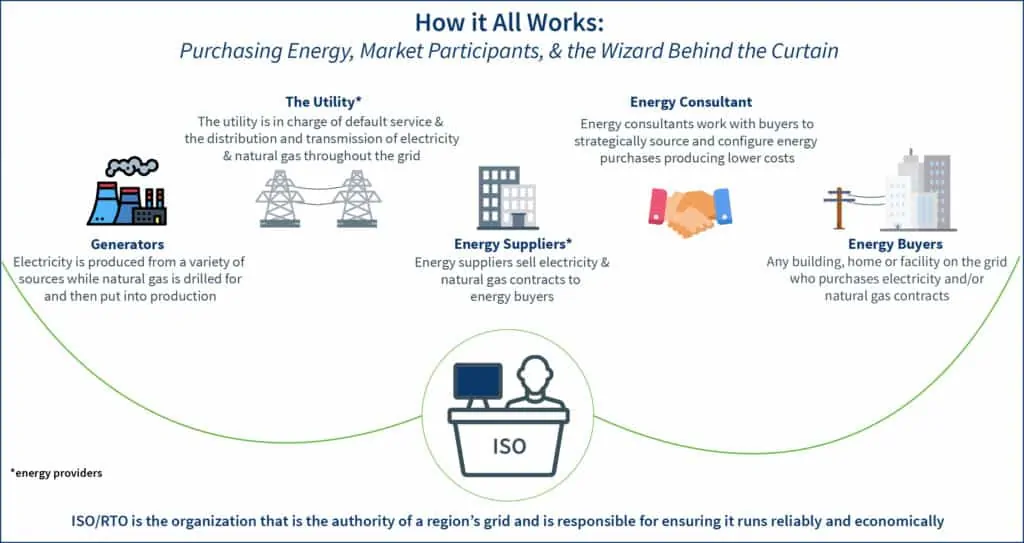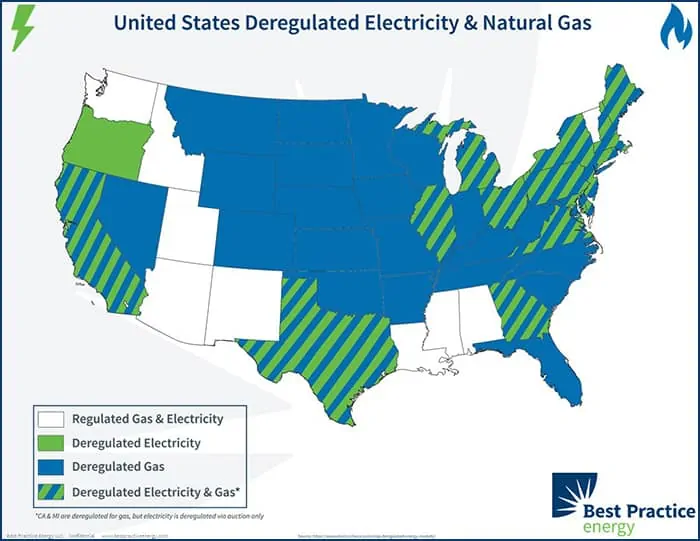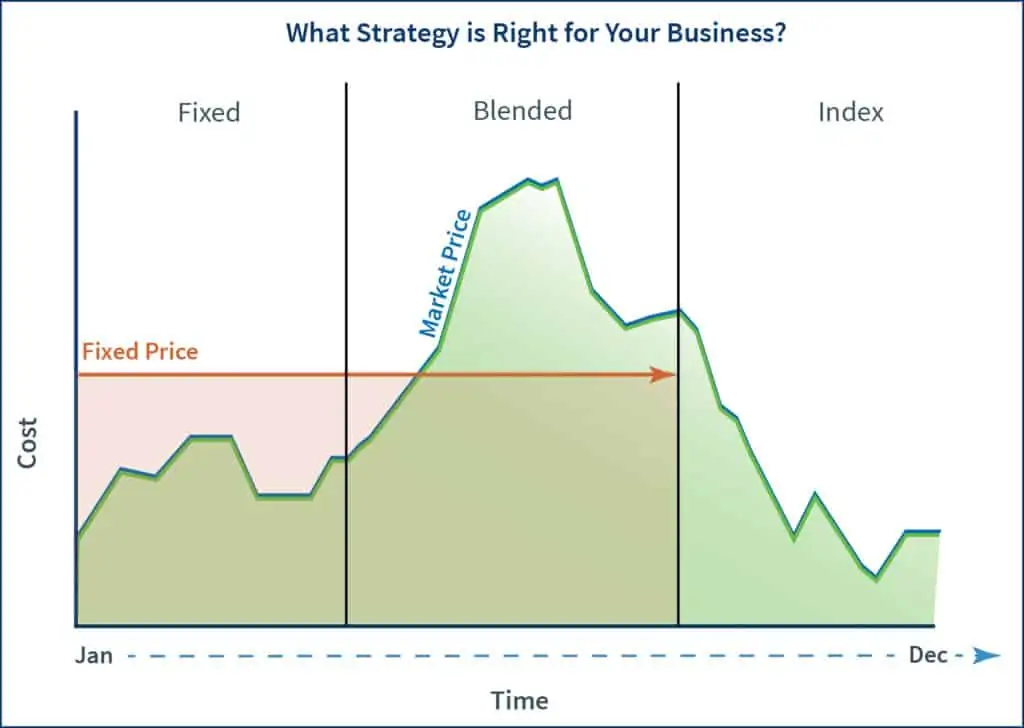Who should you buy electricity and natural gas from? What’s the best course of action for your business?
The answers to these questions are dependent on a variety of factors including the location of your business as well as your budget goals. Because deciding who you want to purchase energy from is a vital first step in your energy procurement journey, it is necessary to have a fundamental understanding of the available options before you decide which path to walk down.
In this post we layout some facts about the different ways to purchase energy so you can make an informed decision of which is the right choice for your business.
Utilities
As you may know from our previous Energy 101 post, the utility is in charge of the distribution and transmission of energy throughout the grid. Before energy deregulation, utilities were also the sole provider of energy commodity for buildings (cost per kWh and Dth).
In regulated markets utilities are still the main provider of energy. In states where energy is deregulated, businesses have a choice of who they purchase their energy from: the utility or a 3rd party supplier. If they don’t choose to buy through a supplier, buildings on the grid are automatically entered into the utility’s service program, which is often referred to as ‘default service’ or ‘last resort service’.
The rates businesses pay for electricity and natural gas are determined by a building’s rate class, usage, demand, and multiple other factors. While these help to dictate the price your business pays for energy no matter who you decide to purchase it from, you are losing a strategic advantage when you’re on utility default service.
Utility rates are standardized and do not allow buyers to approach energy procurement with strategy. This puts your business’s energy bills at the mercy of utility rates and provides little to no control over managing costs down.
Energy Suppliers
Another way to purchase energy is through an energy supplier. These are 3rd party suppliers, also referred to as retail energy providers or alternative suppliers, that supply electricity and/or natural gas contracts to buildings on the grid. These suppliers are only licensed to provide these energy contracts in deregulated markets.
Third party suppliers purchase energy from generators and sell the access to it to buildings in their designated areas. Their supply is sold directly to customers in the form of contracts that last for multiple years. Purchasing through an energy supplier allows for buyers to employ a variety of different strategies while purchasing that can significantly reduce costs.
Although energy deregulation was partly born out of driving down prices by creating market competition between energy providers, when you decide to purchase directly through a 3rd party supplier, no competition for your load takes place. This is where energy brokers and energy consultants enter the picture.
Energy Brokers and Energy Consultants
Energy brokers and consultants help buyers purchase energy contracts through 3rd party energy suppliers.
Just like when buying directly through a supplier, brokers and consultants use both general methods such as fully fixed prices and strategic methods like hedging and index spot market pricing. The strategy used is determined by the operations and needs of the business and then molded specifically to them.
Where they diverge, however, is brokers and consultants shop your load in the market and force suppliers to compete for it, which drives prices down.
Essentially, energy brokers act as a partnership for your business to advocate for you in the market and help you make the right purchasing decisions for your business.
Transactional Energy Brokers
While using an energy broker or consultant is generally the best way to take advantage of energy deregulation, energy buyers must beware of poor practices by brokers who operate in ‘transactional’ ways.
These types of brokers are setup to sell as many energy contracts as possible. They often use archaic methods that find a decent price available right before an energy contract is up and fix it in for the entire length. When the contract ends, these types of brokers tend to recommend signing with the incumbent supplier instead of working to develop a new strategy and shop their load around in the market.
Businesses using transactional brokers often won’t even hear from them until it’s time to renew their energy contract!
Energy Consultants
The difference between energy consultants and transactional brokers comes down to how you purchase and the service you receive.
Energy consultants use the antithesis of transactional brokers’ methods to help businesses purchase energy. They advocate for buyers by working closely with them to understand their business at a soup-to-nuts level, provide them with a fully transparent/competitive view of the market, and execute purchasing strategies tailored to their business & budget needs.
Consultants stay with buyers throughout the entirety of their energy procurement journey, guiding them at every point, providing advice, and helping them capture the most possible cost avoidance on their energy bills. This is done by taking a holistic approach to procurement that involves attacking each component of a price through:
- Tailored purchasing methods
- Seasonal strategies
- Capacity curtailment
- Making facilities more efficient
- Using favorable contract language
- Locking in future contracts
One notable concept mentioned above that illustrates the chasm between energy brokers and energy consultants is how we consultants approach purchasing a business’s future energy contracts.
While transactional brokers tend to recommend fixed prices for the entire contract term and purchase using the same type of strategy when the contract is up, we consultants are always looking towards our clients’ future contracts. Here at Best Practice Energy, we use a variety of data nodes to keep a watchful eye on the market to determine opportune conditions. When a ‘buy’ signal pops up, we start hedging portions of their next contract while they’re still in their current one.
For example, if a business has a contract that is locked in from 2019 through 2022, a skillful energy consultant will start watching the market and locking in portions of their next contract that starts in 2023. This progressive style of purchasing takes advantage of less volatile future markets and helps maximize cost avoidance.
In regulated markets, there is only one way to purchase energy: through the utility. In deregulated markets, however, businesses and residents can choose to stay on default utility service, purchase directly through a 3rd party supplier, or use an energy broker or consultant to strategically purchase through a supplier.
All of these purchasing methods are viable options. However, to take full advantage of energy deregulation and capture maximum cost avoidance on your bills, using an energy consultant is the best approach. If you choose to go a different way, it’s not ‘bad’ or ‘wrong’, but, as we’ve proven time and time again in our case studies, you are leaving value on the table.
Follow us on social media to find out more about Best Practice Energy and why we’re the right energy consultant for your business. Contact us today and we’ll even perform a free electricity and natural gas consultation to show you what we can accomplish by working together!



